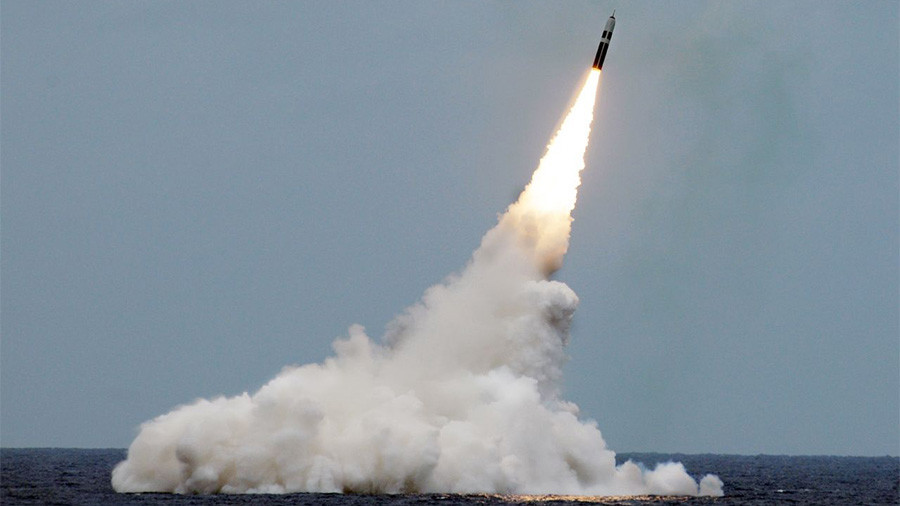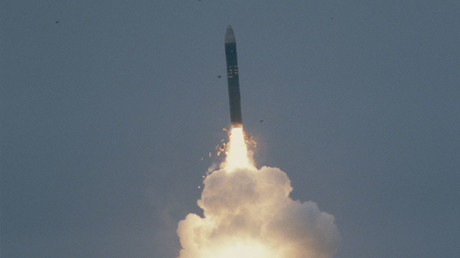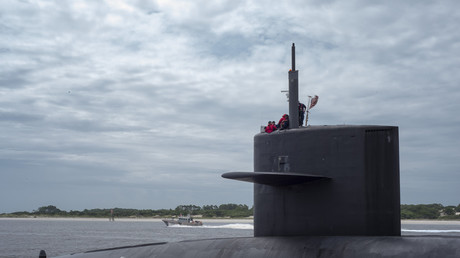- Joined
- Jul 9, 2011
- Messages
- 2,759
- Points
- 48
Dotard is going to use nuke even if you threw popcon or shoe at him, so Xi might as well nuke 1st strike from the very beginning.
https://www.rt.com/usa/417748-us-nuclear-review-russia/
US ready to use nukes in case of conventional attack - Nuclear Posture Review
Published time: 2 Feb, 2018 19:37 Edited time: 2 Feb, 2018 20:08
Get short URL

FILE PHOTO: An unarmed Trident II D5 missile is launched from the Ohio-class ballistic-missile submarine USS Maryland © U.S. Navy
The US is more likely to use nuclear weapons, according to the new Nuclear Posture Review (NPR) just released by the administration of President Donald Trump.
Washington’s new Nuclear Posture Review (NPR) recommends a hawkish approach to cooperation with Russia over nuclear proliferation, and further calls for the US to tackle “an unprecedented range and mix of threats” posed by foreign powers including Russia, China, North Korea and Iran.
A key shift from existing nuclear weapons policy is the expansion of scenarios in which a nuclear threats would be considered. The document lists non-nuclear attacks that could constitute grounds for US nuclear retaliation. Under the new NPR, a conventional attack which results in mass casualties or targets key infrastructure could trigger a nuclear response.
Read more
 Trump’s new nuke ‘posture’: Draft allows nuclear response to conventional attack and new warheads
Trump’s new nuke ‘posture’: Draft allows nuclear response to conventional attack and new warheads
The review suggests a hawkish approach to cooperation with Russia over nuclear proliferation. It warns that Russia is “developing and deploying new nuclear warheads and launchers” and will “continue to increase its warhead delivery capacity” in the future.
Washington finds “troubling” Russia’s adoption of military strategies and capabilities that rely on nuclear escalation, according to the NPR.
"Russia has demonstrated its willingness to use force to alter the map of Europe and impose its will on its neighbors, backed by implicit and explicit nuclear first-use threats," the report says.
"We do not want to regard Russia as an adversary," said Acting Assistant Secretary of State for Arms Control, Verification and Compliance, Anita E. Friedt said at the NPR roll-out at the Pentagon on Friday. “This not a Russia-centric NPR."
The US “remains committed to the moratorium on nuclear testing." National Nuclear Security Administration Administrator Steve Erhart added.
The review also calls for more integration between nuclear and non-nuclear forces, and upgrading F-35 fighter aircraft to carry nuclear bombs and missiles. In doing so, the line between nuclear and non-nuclear warfare becomes less clear.
“US forces will strengthen their ability to integrate nuclear and non-nuclear military planning and operations,’ the NPR says.
https://www.rt.com/usa/417748-us-nuclear-review-russia/
US ready to use nukes in case of conventional attack - Nuclear Posture Review
Published time: 2 Feb, 2018 19:37 Edited time: 2 Feb, 2018 20:08
Get short URL

FILE PHOTO: An unarmed Trident II D5 missile is launched from the Ohio-class ballistic-missile submarine USS Maryland © U.S. Navy
The US is more likely to use nuclear weapons, according to the new Nuclear Posture Review (NPR) just released by the administration of President Donald Trump.
Washington’s new Nuclear Posture Review (NPR) recommends a hawkish approach to cooperation with Russia over nuclear proliferation, and further calls for the US to tackle “an unprecedented range and mix of threats” posed by foreign powers including Russia, China, North Korea and Iran.
A key shift from existing nuclear weapons policy is the expansion of scenarios in which a nuclear threats would be considered. The document lists non-nuclear attacks that could constitute grounds for US nuclear retaliation. Under the new NPR, a conventional attack which results in mass casualties or targets key infrastructure could trigger a nuclear response.
Read more
 Trump’s new nuke ‘posture’: Draft allows nuclear response to conventional attack and new warheads
Trump’s new nuke ‘posture’: Draft allows nuclear response to conventional attack and new warheads The review suggests a hawkish approach to cooperation with Russia over nuclear proliferation. It warns that Russia is “developing and deploying new nuclear warheads and launchers” and will “continue to increase its warhead delivery capacity” in the future.
Washington finds “troubling” Russia’s adoption of military strategies and capabilities that rely on nuclear escalation, according to the NPR.
"Russia has demonstrated its willingness to use force to alter the map of Europe and impose its will on its neighbors, backed by implicit and explicit nuclear first-use threats," the report says.
"We do not want to regard Russia as an adversary," said Acting Assistant Secretary of State for Arms Control, Verification and Compliance, Anita E. Friedt said at the NPR roll-out at the Pentagon on Friday. “This not a Russia-centric NPR."
The US “remains committed to the moratorium on nuclear testing." National Nuclear Security Administration Administrator Steve Erhart added.
The review also calls for more integration between nuclear and non-nuclear forces, and upgrading F-35 fighter aircraft to carry nuclear bombs and missiles. In doing so, the line between nuclear and non-nuclear warfare becomes less clear.
“US forces will strengthen their ability to integrate nuclear and non-nuclear military planning and operations,’ the NPR says.








 US ready to use nukes in case of conventional attack - Nuclear Posture Review
US ready to use nukes in case of conventional attack - Nuclear Posture Review  'Russia threat' used as excuse to funnel trillions into military industry – Russian envoy to US
'Russia threat' used as excuse to funnel trillions into military industry – Russian envoy to US 